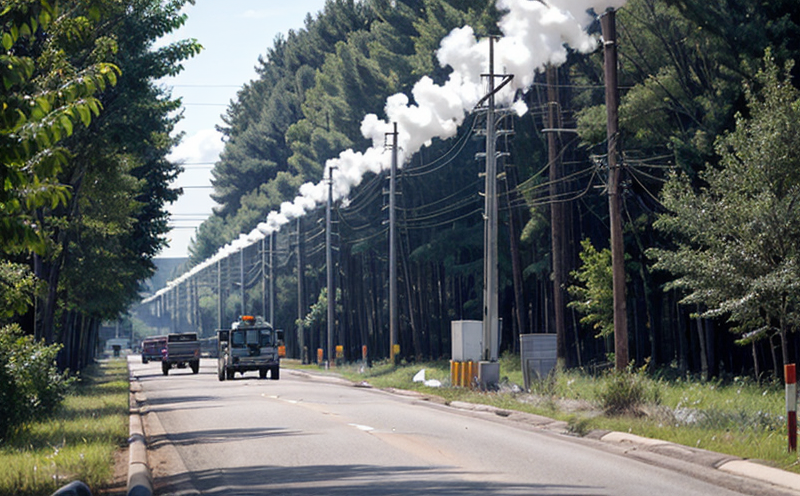EN 15259 Stationary Source Emission Measurement Compliance Testing
The European Normative Standard EN 15259 provides a robust framework for measuring stationary source emissions, ensuring that power and utilities enterprises meet stringent environmental regulations. This service is pivotal in the context of the Power & Utilities sector, where compliance with emission limits is non-negotiable to safeguard public health and the environment.
Stationary sources include facilities such as power plants, industrial boilers, and combustion systems used for electricity generation or process heating. The testing under EN 15259 ensures that these sources operate within legally defined emission limits set by regulatory bodies like the European Commission and national governments. This service is particularly vital given the increasing emphasis on reducing greenhouse gases (GHGs) and other pollutants such as nitrogen oxides, sulfur dioxide, particulate matter, and volatile organic compounds.
The testing methodology outlined in EN 15259 involves a series of steps that ensure accurate measurement. These include:
- Identification of the emission source and its operational parameters
- Installation of sampling points and monitoring equipment
- Conducting continuous or periodic emissions measurements
- Data logging and analysis
- Calculation of compliance with emission limits
The use of this standard is not only mandatory for compliance but also serves as a best practice guide in the sector, helping enterprises to identify areas for improvement beyond regulatory requirements. This proactive approach ensures that businesses are better prepared for future regulatory changes and can enhance their environmental performance.
Real-world applications of EN 15259 include:
- Demonstrating compliance with EU Directives on Air Quality
- Supporting the certification processes for new installations or modifications to existing facilities
- Facilitating the integration of renewable energy sources into the grid by ensuring compatibility and minimal environmental impact
In addition, this service is crucial in fostering a sustainable business model. By adhering to emission limits, enterprises can reduce their carbon footprint, which is essential for long-term viability in an increasingly environmentally conscious market.
Scope and Methodology
The scope of EN 15259 compliance testing encompasses a wide range of stationary sources within the power and utilities sector. It applies to combustion equipment, industrial boilers, and other installations that emit pollutants into the atmosphere. The methodology involves several key components:
- Sampling Point Identification: Determining the optimal location for sampling based on emission characteristics.
- Emission Measurement Equipment: Utilizing state-of-the-art instruments such as gas analyzers, particulate matter monitors, and other specialized equipment to measure emissions accurately.
- Data Collection and Analysis: Collecting real-time data from the monitoring equipment and analyzing it against predefined emission limits.
- Reporting and Compliance Determination: Preparing comprehensive reports that outline test results, compliance status, and recommendations for improvement where necessary.
The methodology is designed to be flexible yet rigorous, allowing for adjustments based on the specific characteristics of each emission source. This ensures that the testing process remains relevant and effective across different types of facilities.
Eurolab Advantages
Our team at Eurolab is dedicated to providing unparalleled support in EN 15259 compliance testing. With a deep understanding of the sector and extensive experience, we offer several key advantages:
- Expertise and Experience: Our staff are highly trained professionals with hands-on experience in conducting complex emission tests.
- Advanced Equipment: We have access to the latest technology for accurate measurement and data analysis.
- Comprehensive Reporting: Detailed reports that not only confirm compliance but also provide insights into potential areas of improvement.
- Customized Solutions: Tailored testing plans that address specific needs and challenges faced by clients in the Power & Utilities sector.
By leveraging these advantages, Eurolab ensures that our clients remain compliant with all relevant regulations while also positioning themselves as leaders in environmental responsibility.
Environmental and Sustainability Contributions
The compliance testing under EN 15259 significantly contributes to the sustainability goals of power and utilities enterprises. By ensuring that stationary sources operate within emission limits, this service helps in:
- Reducing Greenhouse Gas Emissions: Lowering carbon footprints to mitigate climate change.
- Improving Air Quality: Minimizing the release of pollutants that can harm human health and ecosystems.
- Sustaining Renewable Energy Integration: Ensuring compatibility between traditional power sources and renewable energy systems, thereby supporting a more sustainable grid.
Through these contributions, EN 15259 compliance testing plays a crucial role in fostering a greener future. By adhering to this standard, enterprises can contribute to global sustainability efforts while also enhancing their own operational efficiency and reputation.





